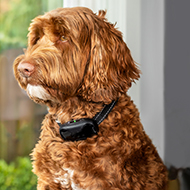Welfare organisations call for electric shock collar ban

In 2018, the Westminster Government committed to introducing a ban when parliamentary time allowed.
Representatives from leading veterinary and animal welfare organisations have called on the Government to ban the use of electric shock collars (ESC) in England.
In an event at Westminster yesterday (28 November), The Kennel Club, Dogs Trust, the RSPCA, Battersea Dogs and Cats Home, the British Veterinary Association and Blue Cross reminded MPs of the 2018 commitment to introduce an ESC ban, and highlighted the importance of this.
Chief executive of The Kennel Club, Mark Beazley, said: “The Kennel Club has long campaigned for a ban on electric shock collars and we are so pleased to be welcoming MPs to this event to demonstrate, alongside our fellow animal welfare charities, a shared commitment to ensuring this is implemented.
“In August 2018, the then Environment Secretary, Michael Gove, announced electric shock collars would be banned, describing the collars as punitive and harmful. It is time for the Government to come good on this promise and introduce regulations to ban these dangerous and unnecessary devices imminently.”
Used to train dogs by punishing unwanted behaviours with administered electric shocks, ESCs have been found to have a serious impact on the welfare of dogs, influencing behaviour and physiological distress.
Despite a ban in Wales and a condemnation in Scottish guidance, England continues to allow the use of ESCs.
Justin Tomlinson MP discussed their support for the organisations' call: “I am honoured to support this coalition of animal welfare charities in the fight to ban electric shock collars.
“For several years we have been calling on the Government to carry out their commitment and bring forward plans to ban electric shock collars, and I hope that this event shows the breadth of support we have in carrying out this mission.
“Wide-ranging evidence proves that not only do they harm our four-legged friends, but shock collars fundamentally also do not fix the root cause of ‘undesirable’ behaviour and can often cause more harm than good.
“That’s why I am backing the call to ban these cruel instruments without further delays.”
RCVS specialist in Veterinary Behavioural Medicine and director of Canine Behaviour and Research at Dogs Trust, Dr Rachel Casey, said: “It is both unnecessary and cruel to use these collars on dogs. They are painful and have a serious negative impact on dogs’ wellbeing. Worse still, they can be a mechanism for abuse if used in anger.
“I will never forget coming across a little terrier when out on a walk, with no owner in sight. He was crouched down, shaking and screaming repeatedly as his e-collar was activated again and again.
“These devices have no place in modern dog training. We know that positive reward-based methods are at least as effective. We know that using e-collars impacts on dog welfare and risks causing further behaviour problems. It is past time for a ban.”



 The latest
The latest